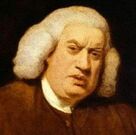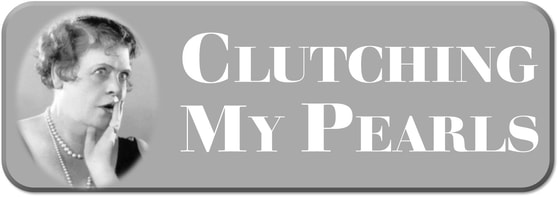| Clutching My Pearls is about Jane Austen and the times she lived in. Those who speak of the past mainly to condemn--but also want to rescue Jane Austen from the dustbin of history--have a bit of a dilemma on their hands. Click here for the first in the series. My "six questions for academics" post is here. |
 Dr. Johnson (1709-1784)
Dr. Johnson (1709-1784) - The name “Fanny” suggests lady parts and prostitution.
- Fanny Price shares her name with Fanny Hill, a prostitute in a famous book which is still read today.
- Dr. Johnson, one of Austen’s favourite authors, wrote two essays about a prostitute, and the prostitute’s life story has plot similarities to Mansfield Park. Austen intended for her readers to notice this connection.
- A lewd riddle referenced in Emma includes the name “Fanny," a name associated with prostitutes, see #1.
Dr. Samuel Johnson (1709-1784), known as “the Doctor,” was—as Austenites know—Austen’s favorite moral writer in prose. The compiler of a famous dictionary and author of many essays, memoirs, and other works, he is a towering figure in English letters. Here is Heydt-Stevenson’s passage about Dr. Johnson where she asserts a definite connection between Mansfield Park and two essays by Dr. Johnson.
| “Austen also associates courtship with prostitution through the significant intertextual relations between [Fanny Price’s] story and [two essays by Dr. Johnson] numbers 170 and 171 from [the periodical] The Rambler. “The History of Misella Debauched by her relation” and “Misella’s Description of the Life of a Prostitute,” a sentimental narrative of a poor young woman seduced by her cousin/guardian.” and “The remarkable parallels between these two narratives—parallels that critics have not previously noted—suggest that Austen was working both with and against Johnson’s (apparently) nonfictional account.” |
- Yes, both stories start off the same way.
- But they diverge: Misella is groomed into prostitution and a life of misery and infamy, while Fanny Price is pressured to marry someone she doesn't love and then marries the man she loves.
- Heydt-Stevenson assumes that somebody who reads a story about a girl being pressured to make a financially advantageous marriage would think of prostitution and would think specifically of Johnson's essays. However,
- I can point to many stories featuring dependent females, so the "remarkable" parallels between Johnson and Austen are not so remarkable. It was a standard literary trope of the day and the starting point for many novels.
- I can point to quite a few stories in which the vulnerable female is pressured to become a courtesan; in other words, these stories more closely resemble Johnson's story than does Mansfield Park.
- I can point to stories that more closely resemble Mansfield Park than does Johnson's essay.
- I can point to stories where "fallen women" aka "deviant sisters," are treated sympathetically, as in Johnson's essay.
- But "deviant sisters" are not treated sympathetically in Mansfield Park.
- By tracing the roots of Mansfield Park to Johnson’s essay, Heydt-Stevenson attempts to strengthen her contention that Fanny Price’s story “collapse[s] the boundary between marriage and prostitution." But her assertion that there's a connection between Mansfield Park and Johnson's essays is nothing more than that—an assertion.
 Progress of a Woman of Pleasure (detail)
Progress of a Woman of Pleasure (detail) The only similarity between the two essays and Mansfield Park occurs at the beginning of Johnson’s first essay in which Misella, (telling her story in the first person) explains: “I am of a good family, but my father was burthened with more children than he could decently support. A wealthy relation, as he travelled from London to his country seat, condescending to make him a visit, was touched with compassion… and resolved [to take] the care of a child upon him.”
2) After this opening, the plot, and as I will argue, the theme, diverges completely from Mansfield Park. Misella, financially dependent on her guardian, “saw with horror that he was contriving to perpetuate his gratification, and was desirous to fit me to his purpose, by complete and radical corruption.” She gives in, becomes pregnant, and it looks like she induces an miscarriage: (“He provided all that was necessary and in a few weeks congratulated me upon my escape from the danger which we had both expected with so much anxiety.”) Misella subsequently becomes the mistress of other men, and finally sinks to common prostitution. This is a story of sexual grooming that was undoubtedly all too true then and still true today.

This is a remarkably wild leap in the dark for Heydt-Stevenson to make in the face of all the contrary textual evidence. She can of course believe whatever she wants about marriage and prostitution. But to assert so confidently that Johnson--a man of strictly orthodox religious views--would see things the same way, is rather bewildering.
Johnson's message and purpose was NOT to equate marriage with being a sex worker. Misella's story is both a warning and a call for compassion. Misella writes: “I am one of those beings from whom many, that melt at the sight of all other misery, think it meritorious to withhold relief; one whom the rigour of virtuous indignation dooms to suffer without complaint, and perish without regard…" The prostitute is an outcast from society. Johnson's purpose was to urge compassion for women who have few economic choices in life and no legal independence, who are essentially forced into the sex trade.
 Sir Charles Grandison rescues Harriet Byron
Sir Charles Grandison rescues Harriet Byron - For more novels about poor dependent females living with relatives or other benefactors, consider Anna, or Memoirs of a Welch Heiress (1797), The Bristol Heiress (1809), Motherless Mary, (1816), The Spinster's Tale, (1801), The Woman of Letters (1783), and The Gipsey Countess (1799).
- There are many, many stories about innocent girls being pressured into becoming courtesans including the influential Samuel Richardson novels Pamela and Clarissa. Or try The Woman of Letters (1783), Anna, or Memoirs of a Welch Heiress (1797), Constance (1785), or The Officer's Daughter (1810). See also "the fate worse than death."
- For novels with similarities to Mansfield Park, try Celia in Search of a Husband (1809), Maria Edgeworth's Madame Panache (1806), Clarentine (1796), Geraldine (1820), and Fanny, a novel, in a series of letters (1786).
- For heroines who are benevolent to "fallen women," try Albert, or the Wilds of Strathnarven (1799), Celia in Search of a Husband (1809), The Officer's Daughter (1810), and Fanny Fitz York (1818).
- The History of Fanny Seymour (1769) is notable for its protest of the way girls were forced into marriage as a financial arrangement between families and it also treats a "fallen woman" very sympathetically. But it still doesn't "collapse the boundaries" between sex work and marriage insofar as the attitudes of the characters are concerned.
- In an age when marriages were about alliances between families, and not about romantic love, males as well as females were pressured to marry for money. Young men are coerced in The Woman of Letters (1783), Anna, or Memoirs of a Welch Heiress (1785), The Denial, or The Happy Retreat (1792), Consequences or Adventures at Rraxal Castle (1797), Thinks I to Myself (1812), Coraly (1819), and both the hero and heroine face this dilemma in the play The Runaway (1776).
 Happy ending or bitter ironic joke?
Happy ending or bitter ironic joke? 8) Heydt-Stevenson argues that “Mansfield Park provides the opportunity to break down oppositions between respectable women and their deviant sisters, insofar as their bodies are negotiated as agents of exchange.”
But--quite obviously--Mansfield Park is the most judgmental of Austen’s novels when it comes to “deviant sisters.” Maria Bertram is punished for adultery, in contrast to Lydia Bennet, who is not punished for fornication in Pride & Prejudice. The compassion that Dr. Johnson urges his readers to show to fallen women is on display in Sense & Sensibility, in Colonel Brandon’s anguish over his lost love Eliza who was forced into marriage and the ran away with a lover. In Mansfield Park, Edmund and Sir Thomas are so disgusted by Maria and Henry’s “crime” that they don’t want her to marry Henry, and Maria can never darken the door of Mansfield Park again.
Heydt-Stevenson handles disjunction between her anti-patriarchal theories and the actual tone of Mansfield Park by explaining that Austen is intentionally having it both ways (emphasis added): “The remarkable parallels between these two narratives—parallels that critics have not previously noted—suggest that Austen was working both with and against Johnson’s (apparently) nonfictional account.” And: "Austen denounces the unequal ratio between male freedom and female constraint... [but she] also seems to acknowledge the irony [that she's written a marriage-plot novel] even though she is aware of the disturbing possibilities inherent in courtship..."
That "seems to" is doing a lot of heavy lifting.
Heydt-Stevenson's theory is therefore unassailable: everything that accords with her theory supports her theory, and everything that contradicts it supports her theory as well. Because irony.
Girls being coerced into mercenary marriages is absolutely a central trope of the age, in both comedy and tragedy, and readers would not have been singularly struck by its deployment in Mansfield Park. In tragedy, the girl dies. In comedy, the girl triumphs and marries the man she loves. But in either case, readers would not have shrugged their shoulders and said, "so what, marriage is like prostitution anyway."
 The Outcast (detail), Richard Redgrave
The Outcast (detail), Richard Redgrave For Heydt-Stevenson's theory to hold together, we must conclude that Fanny and Edmund are not a happy couple who love and respect one another. Edmund doesn't mean it when he says Fanny is "too good" for him. Fanny is a willing accomplice in the bleak masquerade that is courtship and marriage. “Austen’s final joke is that one of the fallen women is in the parsonage.” And: “in such a society, all women are fallen." I know many people are not satisfied with the Edmund/Fanny pairing, but that's not the same as declaring the novel is a dark satiric attack on marriage and the patriarchy.
(9) As mentioned, Heydt-Stevenson's flimsy chain of reasoning relies on the assumption that Austen and Dr. Johnson have the same attitudes towards marriage and prostitution, that the former was just a prettied-up version of the latter. I don't think so. I don't think Austen, as a conventional churchwoman, held so low a view of matrimony. Here are some quotes from Dr. Johnson on marriage. I don't see any quotes where he says it's like prostitution. See also a discussion of 18th century attitudes about female chastity.
In future posts I'll tell you about: a novel that resembles Mansfield Park much more closely than the Misella essays, and a novel that takes up the topic of prostitution far more explicitly than Austen. For more critiques on modern Austen scholarship, see here.
| Previous post: "Why do I not see my little Fanny?" When I got to the end of A Contrary Wind, my novel based on Mansfield Park, I decided that Fanny Price was just not ready for marriage. She needed to grow up and find herself first. So the book became a trilogy. Click here for more about my books. Scholar Elaine Bander gives an excellent overview of the Georgian novel and how Austen both parodied and adapted its tropes in her own work, in "Jane Austen and the Georgian Novel," in The Routledge Companion to Jane Austen. United Kingdom, Taylor & Francis, 2021. Heydt-Stevenson, Jillian. Austen's Unbecoming Conjunctions : Subversive Laughter, Embodied History / Palgrave Macmillan, 2005 | Next post: Fanny, the forgiving heroine "I'm felicitous, since during the course of the penultimate solar sojourn, I terminated my uninterrupted categorisation of the vocabulary of our post-Norman tongue." |

 RSS Feed
RSS Feed